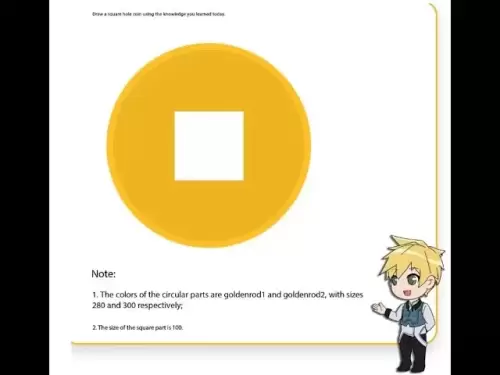-
 Bitcoin
Bitcoin $118400
0.47% -
 Ethereum
Ethereum $3836
2.20% -
 XRP
XRP $3.157
2.98% -
 Tether USDt
Tether USDt $0.9999
-0.03% -
 BNB
BNB $801.5
1.31% -
 Solana
Solana $180.9
2.07% -
 USDC
USDC $0.9999
-0.02% -
 Dogecoin
Dogecoin $0.2225
2.50% -
 TRON
TRON $0.3285
-1.02% -
 Cardano
Cardano $0.7789
2.60% -
 Hyperliquid
Hyperliquid $43.60
2.39% -
 Sui
Sui $3.892
4.41% -
 Stellar
Stellar $0.4229
3.34% -
 Chainlink
Chainlink $18.01
3.98% -
 Hedera
Hedera $0.2745
6.77% -
 Bitcoin Cash
Bitcoin Cash $582.3
3.38% -
 Avalanche
Avalanche $23.77
1.04% -
 Ethena USDe
Ethena USDe $1.001
0.01% -
 Toncoin
Toncoin $3.493
3.59% -
 Litecoin
Litecoin $110.0
2.48% -
 UNUS SED LEO
UNUS SED LEO $8.936
-0.37% -
 Shiba Inu
Shiba Inu $0.00001304
2.49% -
 Uniswap
Uniswap $9.999
1.09% -
 Polkadot
Polkadot $3.897
3.26% -
 Monero
Monero $308.6
-0.83% -
 Dai
Dai $0.9999
-0.01% -
 Bitget Token
Bitget Token $4.504
-0.04% -
 Pepe
Pepe $0.00001154
2.95% -
 Cronos
Cronos $0.1471
3.06% -
 Ethena
Ethena $0.6691
19.53%
Does SOL trading support DEX (decentralized exchange)?
SOL trading on Solana's DEXs like Serum, Raydium, and Orca offers fast, low-fee transactions, but users should be aware of liquidity and smart contract risks.
Apr 19, 2025 at 05:21 am
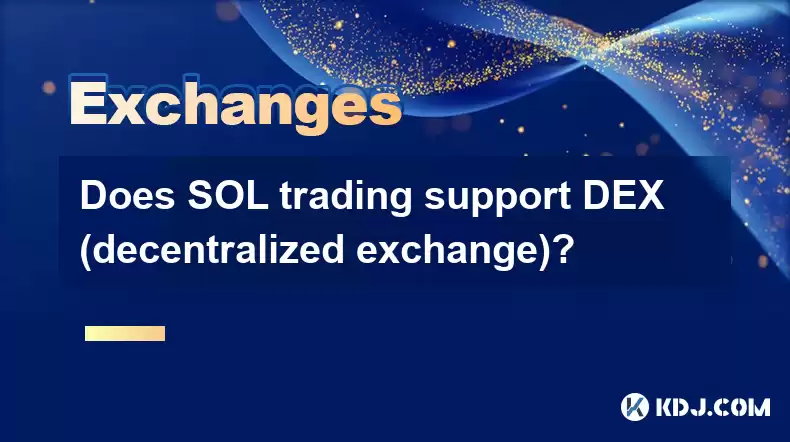
Solana (SOL), a high-performance blockchain platform, has gained significant attention in the cryptocurrency community for its fast transaction speeds and low fees. One of the key aspects that traders and investors often inquire about is whether SOL trading supports decentralized exchanges (DEXs). In this article, we will explore this topic in detail, providing comprehensive information on how SOL interacts with DEXs and what traders can expect.
Understanding Decentralized Exchanges (DEXs)
Decentralized exchanges (DEXs) are platforms that allow users to trade cryptocurrencies directly with one another without the need for a centralized intermediary. These platforms operate on blockchain technology, ensuring that users maintain control over their funds and transactions. DEXs have become increasingly popular due to their emphasis on privacy, security, and user autonomy.
Solana's Integration with DEXs
Solana's ecosystem has embraced the concept of decentralized exchanges, offering several DEXs that operate on its blockchain. This integration allows users to trade SOL and other tokens natively on the Solana network, benefiting from its high throughput and low transaction costs. Some of the prominent DEXs on Solana include Serum, Raydium, and Orca.
How to Trade SOL on a DEX
Trading SOL on a DEX involves a few straightforward steps. Here is a detailed guide on how to do it:
- Choose a DEX: Start by selecting a DEX that operates on the Solana blockchain. Popular options include Serum, Raydium, and Orca.
- Connect Your Wallet: Most DEXs on Solana require you to connect a compatible wallet, such as Phantom or Solflare. Ensure your wallet is funded with SOL or other tokens you wish to trade.
- Navigate to the Trading Interface: Once connected, navigate to the trading interface of the DEX. You will typically find options to swap tokens or engage in liquidity provision.
- Select Tokens: Choose the tokens you want to trade. For instance, if you want to trade SOL for another token, select SOL as the token you are selling and the desired token as the one you are buying.
- Enter Amount and Confirm: Enter the amount of SOL you wish to trade, review the transaction details, and confirm the trade. The DEX will execute the trade based on the available liquidity and prevailing market rates.
- Review and Withdraw: After the trade is executed, review your transaction history and withdraw your tokens to your wallet if necessary.
Benefits of Trading SOL on DEXs
Trading SOL on DEXs offers several advantages that appeal to many users in the cryptocurrency space. Security is a primary benefit, as DEXs do not require users to deposit their funds into a centralized platform, reducing the risk of hacks and theft. Privacy is another significant advantage, as DEXs typically do not require users to go through KYC (Know Your Customer) processes. Additionally, lower fees and faster transaction times are notable benefits of using Solana-based DEXs, thanks to the blockchain's efficient architecture.
Risks and Considerations
While trading SOL on DEXs has many benefits, it is essential to be aware of the potential risks and considerations. Liquidity can be a concern, as some DEXs may have lower liquidity compared to centralized exchanges, which can impact the ease of executing large trades. Smart contract risks are also a factor, as DEXs rely on smart contracts to facilitate trades, and vulnerabilities in these contracts can lead to losses. It is crucial for users to conduct thorough research and understand the risks before engaging in DEX trading.
Comparing DEXs on Solana
Different DEXs on the Solana network offer varying features and user experiences. Serum is known for its order book-based trading system, which provides a more traditional trading experience. Raydium, on the other hand, combines automated market maker (AMM) functionality with Serum's order book, offering a hybrid approach. Orca focuses on simplicity and user-friendliness, making it an attractive option for beginners. Understanding the strengths and weaknesses of each DEX can help traders choose the platform that best suits their needs.
Practical Examples of SOL Trading on DEXs
To illustrate how SOL trading works on DEXs, let's consider a few practical examples. Suppose a user wants to trade 100 SOL for USDC on Raydium. They would connect their wallet, navigate to the Raydium interface, select SOL as the token to sell and USDC as the token to buy, enter the amount (100 SOL), review the transaction details, and confirm the trade. Raydium would then execute the trade based on the available liquidity, and the user would receive the equivalent amount of USDC in their wallet.
In another example, a user might want to provide liquidity to a Serum pool by depositing an equal value of SOL and another token. They would connect their wallet, navigate to the Serum liquidity pools, select the desired pool, enter the amount of SOL and the other token they wish to deposit, review the transaction details, and confirm the deposit. By providing liquidity, the user would earn trading fees generated by the pool.
Frequently Asked Questions
Q: Can I trade other tokens on Solana DEXs besides SOL?
A: Yes, Solana DEXs support trading a wide variety of tokens beyond SOL. Users can trade other tokens native to the Solana ecosystem, as well as tokens bridged from other blockchains.
Q: Are there any fees associated with trading on Solana DEXs?
A: Yes, trading on Solana DEXs involves fees, which typically include transaction fees paid to the Solana network and potential fees charged by the DEX itself. However, these fees are generally lower compared to centralized exchanges.
Q: How do I ensure the security of my funds when trading on Solana DEXs?
A: To ensure the security of your funds, use reputable wallets like Phantom or Solflare, enable two-factor authentication, and never share your private keys or seed phrases. Additionally, be cautious of phishing attempts and only interact with verified DEX interfaces.
Q: Can I use leverage when trading SOL on Solana DEXs?
A: Some Solana DEXs offer leveraged trading through features like margin trading or lending protocols. However, these features may not be available on all DEXs, and users should thoroughly understand the risks associated with leveraged trading before engaging in it.
Disclaimer:info@kdj.com
The information provided is not trading advice. kdj.com does not assume any responsibility for any investments made based on the information provided in this article. Cryptocurrencies are highly volatile and it is highly recommended that you invest with caution after thorough research!
If you believe that the content used on this website infringes your copyright, please contact us immediately (info@kdj.com) and we will delete it promptly.
- SEC, Crypto, and Securities: Navigating the New Frontier
- 2025-08-01 05:10:12
- Cardano (ADA) Market Cap: Can It Compete with Emerging Cryptocurrencies and Meme Coins?
- 2025-08-01 04:30:12
- SEC, Crypto, and On-Chain: Navigating the Regulatory Maze
- 2025-08-01 02:31:40
- Jito Labs, Solana, and Liquid Staking: Riding the Wave of Innovation
- 2025-08-01 03:50:12
- Perpetual DEX: Navigating Onchain Trading and Solving Core Problems, a NY Perspective
- 2025-08-01 03:57:53
- Bitcoin Bullish Market: How Long Positions are Boosting the Crypto King
- 2025-08-01 02:35:33
Related knowledge
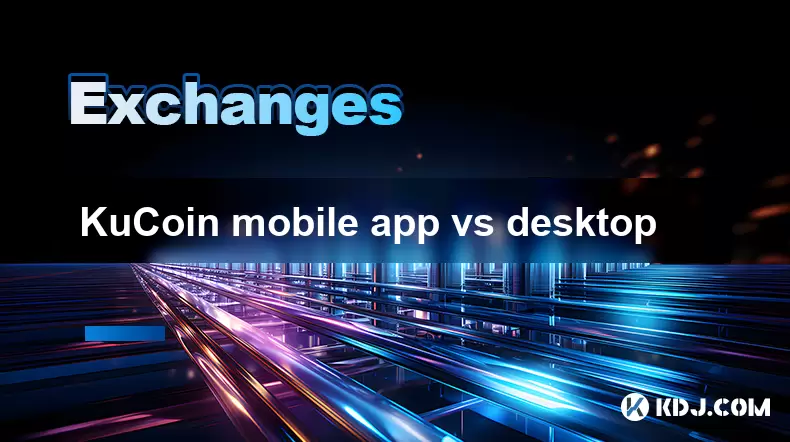
KuCoin mobile app vs desktop
Jul 19,2025 at 08:35am
Overview of KuCoin Mobile App and Desktop PlatformThe KuCoin ecosystem offers both a mobile app and a desktop platform, each designed to cater to diff...
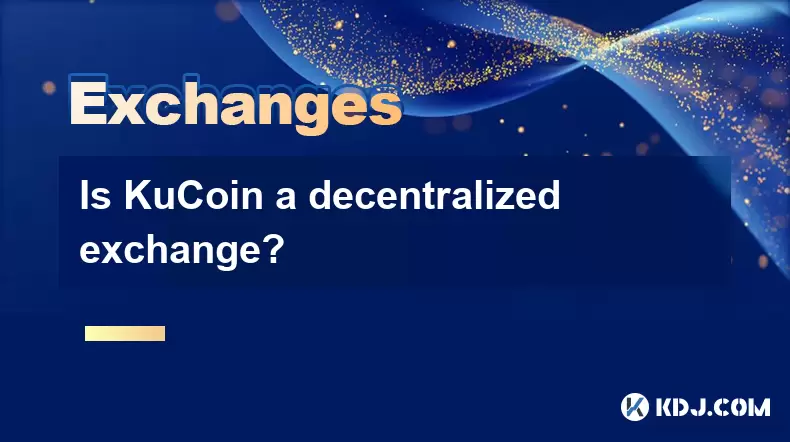
Is KuCoin a decentralized exchange?
Jul 18,2025 at 03:15pm
Understanding Decentralized Exchanges (DEXs)To determine whether KuCoin is a decentralized exchange, it's essential to first understand what defines a...
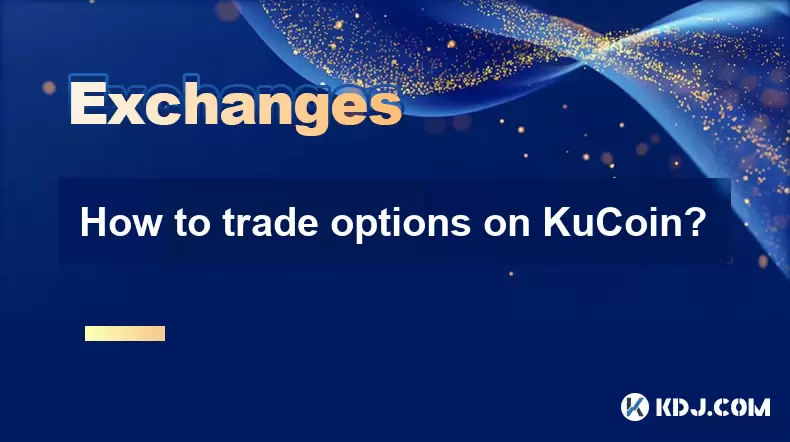
How to trade options on KuCoin?
Jul 19,2025 at 03:42am
Understanding Options Trading on KuCoinOptions trading on KuCoin allows users to speculate on the future price movements of cryptocurrencies without o...
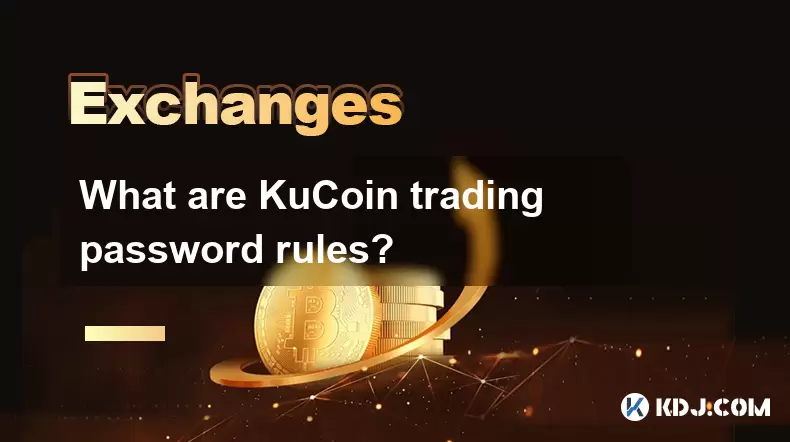
What are KuCoin trading password rules?
Jul 20,2025 at 07:56am
Understanding the Purpose of a Trading Password on KuCoinOn KuCoin, a trading password serves as an additional layer of security beyond the standard l...
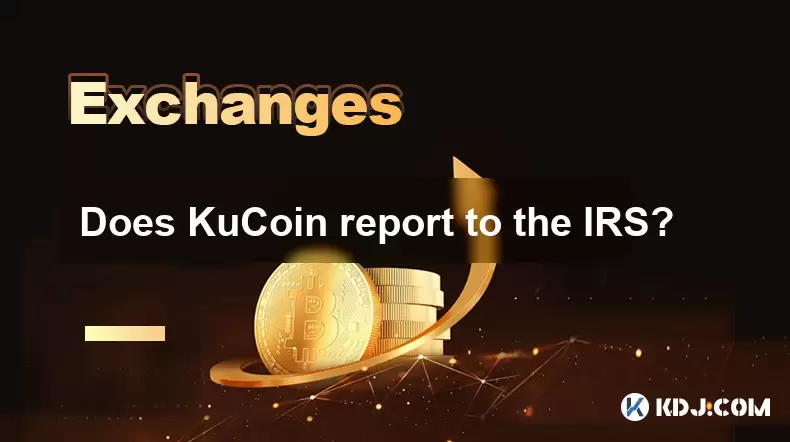
Does KuCoin report to the IRS?
Jul 27,2025 at 05:01am
Understanding the Reporting Obligations of KuCoinCryptocurrency exchanges are increasingly under scrutiny from global tax authorities, and KuCoin is n...

Who is the CEO of KuCoin?
Jul 20,2025 at 09:35am
Background of KuCoinKuCoin is one of the largest cryptocurrency exchanges globally, known for its diverse range of trading pairs and user-friendly int...

KuCoin mobile app vs desktop
Jul 19,2025 at 08:35am
Overview of KuCoin Mobile App and Desktop PlatformThe KuCoin ecosystem offers both a mobile app and a desktop platform, each designed to cater to diff...

Is KuCoin a decentralized exchange?
Jul 18,2025 at 03:15pm
Understanding Decentralized Exchanges (DEXs)To determine whether KuCoin is a decentralized exchange, it's essential to first understand what defines a...

How to trade options on KuCoin?
Jul 19,2025 at 03:42am
Understanding Options Trading on KuCoinOptions trading on KuCoin allows users to speculate on the future price movements of cryptocurrencies without o...

What are KuCoin trading password rules?
Jul 20,2025 at 07:56am
Understanding the Purpose of a Trading Password on KuCoinOn KuCoin, a trading password serves as an additional layer of security beyond the standard l...

Does KuCoin report to the IRS?
Jul 27,2025 at 05:01am
Understanding the Reporting Obligations of KuCoinCryptocurrency exchanges are increasingly under scrutiny from global tax authorities, and KuCoin is n...

Who is the CEO of KuCoin?
Jul 20,2025 at 09:35am
Background of KuCoinKuCoin is one of the largest cryptocurrency exchanges globally, known for its diverse range of trading pairs and user-friendly int...
See all articles





















